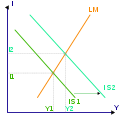Agent-based computational economics (ACE) is the area of computational economics that studies economic processes, including whole economies, as dynamic...
22 KB (2,023 words) - 14:03, 3 August 2025
stochastic general equilibrium modeling, and agent-based modeling inside Complexity Economics. Computational economics developed concurrently with the mathematization...
22 KB (2,038 words) - 14:13, 3 August 2025
to act on behalf of a principal. In agent-based computational economics, corresponding agents are "computational objects modeled as interacting according...
6 KB (634 words) - 12:25, 6 September 2024
An agent-based model (ABM) is a computational model for simulating the actions and interactions of autonomous agents (both individual or collective entities...
90 KB (9,330 words) - 02:23, 2 August 2025
however. Some advantages which mobile agents have over conventional agents are: Computation bundles - converts computational client/server round trips to relocatable...
6 KB (737 words) - 04:04, 18 April 2025
Agent-based social simulation (or ABSS) consists of social simulations that are based on agent-based modeling, and implemented using artificial agent...
11 KB (1,190 words) - 01:15, 19 December 2024
Macroeconomic model (category Economics models)
Macroeconomics Economics Econometrics Computational economics Lucas critique Dynamic stochastic general equilibrium Agent-based computational economics History...
20 KB (2,300 words) - 06:09, 25 January 2025
games. Later work extended their results to computational methods of modeling. Agent-based computational economics (ACE) as a named field is relatively recent...
114 KB (10,734 words) - 21:47, 23 July 2025
by artificial agents based on data of real human behavior. Comparison of agent-based modeling software Agent-based computational economics (ACE) Artificial...
28 KB (2,918 words) - 13:53, 4 July 2025
Microeconomics (redirect from Micro-economics)
agent-based computational economics, general equilibrium, mechanism design, and voting systems, and across such broad areas as experimental economics...
50 KB (5,949 words) - 12:38, 24 June 2025
Economic model (redirect from Model (Economics))
cyber security investments Economic methodology Computational economics Agent-based computational economics Endogeneity Financial model Moffatt, Mike. (2008)...
30 KB (3,870 words) - 08:16, 30 July 2025
economics, Austrian economics, Ecological economics, development and growth economics. Agent-based computational economics studies economic processes as dynamic...
14 KB (1,429 words) - 19:25, 26 June 2025
expectations – Adverse selection – Agent (economics) – Agent-based computational economics – Aggregate demand – Aggregate supply – Agricultural policy...
16 KB (1,393 words) - 03:29, 17 June 2025
language Actor model – Model of concurrent computation GOAL – Language for cognitive agents Shoham, Y. (1990). Agent-Oriented Programming (Technical Report...
8 KB (874 words) - 13:21, 10 February 2025
interactions between economic agents. The complexity science approach has also been applied as the primary field in computational economics. The "nearly archetypal...
29 KB (3,282 words) - 02:42, 2 August 2025
The agent-based modeling (ABM) community has developed several practical agent based modeling toolkits that enable individuals to develop agent-based applications...
7 KB (152 words) - 12:46, 13 March 2025
"agent-based models," The New Palgrave Dictionary of Economics, 2nd Edition. Abstract. Leigh Tesfatsion, 2003. "Agent-based Computational Economics: Modeling...
38 KB (3,811 words) - 15:09, 26 May 2025
modeling is a rule-based, computational modeling methodology that focuses on rules and interactions among the individual components or the agents of the matrix...
34 KB (4,649 words) - 05:47, 14 June 2025
Cost-push inflation (redirect from Economics/Cost push)
economics Complexity economics Computational economics Agent-based computational economics Behavioral economics Pluralism in economics Empirical Econometrics...
5 KB (505 words) - 15:09, 19 April 2025
autonomous processing nodes (agents). To reach the objective, DAI requires: A distributed system with robust and elastic computation on unreliable and failing...
13 KB (1,534 words) - 12:41, 13 April 2025
Representative vs. heterogeneous agents in economics Agent-based computational economics Commodity New Keynesian economics (2010s) Economic inequality M...
4 KB (434 words) - 12:56, 14 March 2025
In economics, economic value is a measure of the benefit provided by a good or service to an economic agent, and value for money represents an assessment...
20 KB (2,608 words) - 05:09, 26 July 2025
Physical Agents (FIPA) is a body for developing and setting computer software standards for heterogeneous and interacting agents and agent-based systems...
5 KB (467 words) - 00:25, 26 April 2024
New classical macroeconomics (redirect from New Classical economics)
profitable (i.e. labor market frictions). New classical economics is based on Walrasian assumptions. All agents are assumed to maximize utility on the basis of...
14 KB (1,636 words) - 20:07, 29 July 2025
the neoclassical economics discipline (Landsberg 1989, 596). Neoclassical economics begins with the a priori assumptions that agents are rational and...
30 KB (2,955 words) - 05:18, 7 June 2025
Bachelor of Economics (BEc or BEcon) is an academic degree, awarded to students who have completed specialised undergraduate studies in economics. Variants...
27 KB (1,665 words) - 19:38, 20 July 2025
science, a software agent is a computer program that acts for a user or another program in a relationship of agency. The term agent is derived from the...
24 KB (2,918 words) - 17:58, 20 May 2025
In economics, statistics, and finance, an index is a number that measures how a group of related data points—like prices, company performance, productivity...
8 KB (790 words) - 09:16, 16 March 2025
Goods (redirect from Bad (economics))
In economics, goods are anything that is good, usually in the sense that it provides welfare or utility to someone. Goods can be contrasted with bads...
19 KB (2,240 words) - 21:00, 31 July 2025
after accounting for the sum or difference of two or more variables. In economics, it is frequently used to imply the remaining value after accounting for...
2 KB (288 words) - 11:19, 14 June 2023






